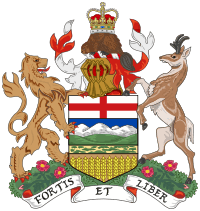Coat of arms of Alberta facts for kids
Quick facts for kids Arms of Alberta |
|
|---|---|
 |
|
| Versions | |

Escutcheon-only
|
|

For use by the Lieutenant Governor of Alberta
|
|
| Armiger | Elizabeth II in Right of Alberta |
| Adopted | 1907, augmented 1980, 2008 |
| Crest | Upon a Helm with a Wreath Argent and Gules a Beaver couchant upholding on its back the Royal Crown both proper. |
| Blazon | Azure, in front of a range of snow mountains proper a range of hills Vert, in base a wheat field surmounted by a prairie both also proper, on a chief Argent a St. George's cross. |
| Supporters | On the dexter side a Lion Or armed and langued Gules and on the sinister side a Pronghorn (Antilocapra americana) proper. |
| Compartment | Compartment : Comprising a grassy mount with the Floral Emblem of the Said Province of Alberta, the Wild Rose (Rosa acicularis), growing therefrom proper. |
| Motto | FORTIS ET LIBER Strong and Free |
The coat of arms of Alberta is a special symbol that represents the Canadian province of Alberta. It's like a unique badge or emblem for the province. This symbol combines parts of Alberta's history, especially its connection to Britain, with things found in Alberta itself. For example, the top part of the shield has a red cross, which is the Saint George's Cross. The lower part shows Alberta's beautiful landscape: the Rocky Mountains, wide-open grass prairies, and fields of wheat.
The first version of Alberta's coat of arms was just the shield. It was officially given to Alberta by King Edward VII on May 30, 1907. Later, on July 30, 1980, Queen Elizabeth II added more parts to the arms. These new parts included supporters (animals holding the shield), a crest (the design on top), and a motto (a short phrase). The shield, with its blue background and symbols, is also featured on Alberta's provincial flag.
Contents
History of the Arms
The story of Alberta's coat of arms began with a special document from King Edward VII. This document, called a royal warrant, officially granted the original shield on May 30, 1907.
Many years later, on July 30, 1980, Queen Elizabeth II made the coat of arms even grander. She added more important parts to it. These additions included a crest, which sits above the shield, and two supporters, which are animals standing on either side. A motto, a short phrase with a special meaning, was also added.
On January 15, 2008, a small change was made to the helmet under the crest. It was updated from a simple steel helmet to a more regal gold royal helmet.
Understanding the Symbols
Each part of the Alberta coat of arms has a special meaning. Together, they tell a story about the province's nature, history, and values.
The Crest
The crest is the design found at the very top of the coat of arms, above the shield. It features a royal helmet with a red and silver wreath. On top of this sits a beaver, which is Canada's official animal. Resting on the beaver's back is St. Edward's Crown, a symbol of royalty. The colors white and red are the official national colours of Canada.
The Shield
The shield is the main part of the coat of arms. It shows the natural beauty and resources of Alberta's diverse landscape.
- The Rocky Mountains and their foothills are shown at the top.
- Below them are the green grass prairies.
- At the very bottom are the cultivated wheat fields, representing Alberta's agriculture.
- The St George's Cross at the top of the shield is a nod to the Hudson's Bay Company. This company once had control over the land that is now Alberta.
The Compartment (Base)
The compartment is the base or ground on which the shield and supporters stand. It is shown as a grassy mound. Growing from this mound are wild roses, which are the official flower of Alberta.
The Supporters
The supporters are the two figures that stand on either side of the shield, holding it up.
- On the left side (from the viewer's perspective) is a golden lion. The lion is a traditional symbol of power and strength.
- On the right side is a pronghorn. The pronghorn represents Alberta's natural wildlife and resources. It's interesting to note that Alberta's official animal is actually the bighorn sheep, not the pronghorn.
The Motto
Below the shield and supporters is a scroll with the motto written on it. The motto is in Latin: Fortis et Liber. This phrase means "strong and free" in English. It is a line taken from the English lyrics of Canada's national anthem, "O Canada".
See also
 In Spanish: Escudo de Alberta para niños
In Spanish: Escudo de Alberta para niños
 | Charles R. Drew |
 | Benjamin Banneker |
 | Jane C. Wright |
 | Roger Arliner Young |

